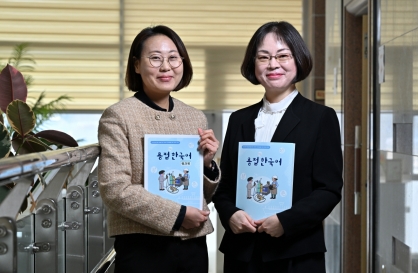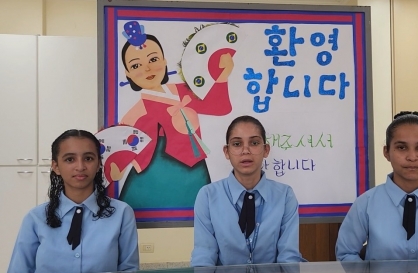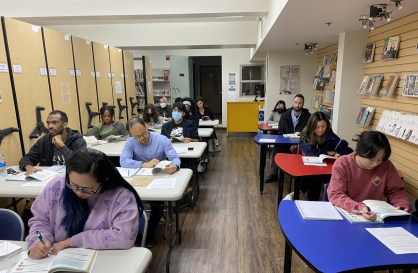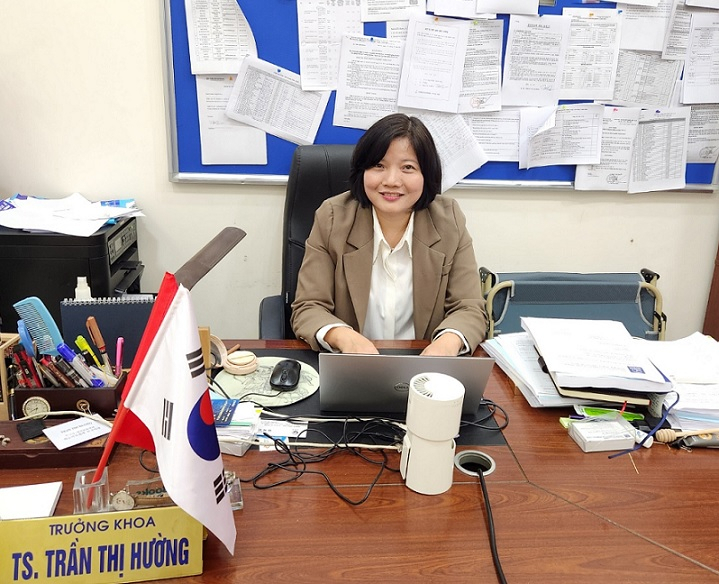Most Popular
Hello Hangeul
-
1
Welding book first in vocational Korean series for foreign labor

-
2
[Korea Beyond Korea] In Sao Paulo, horizons expand for Korean studies
![[Korea Beyond Korea] In Sao Paulo, horizons expand for Korean studies](//res.heraldm.com/phpwas/restmb_idxmake.php?idx=644&simg=/content/image/2023/11/20/20231120000619_0.jpg&u=20231206104853)
-
3
In Brasilia, worldly dreams are born from Korean classes

-
4
Americans seeking to visit Korea learn the language in LA

-
5
[Korea Beyond Korea] Berlin, Europe's Korean Studies hub, nurtures next-gen experts, scholars
![[Korea Beyond Korea] Berlin, Europe's Korean Studies hub, nurtures next-gen experts, scholars](//res.heraldm.com/phpwas/restmb_idxmake.php?idx=644&simg=/content/image/2023/10/18/20231018000929_0.jpg&u=20231023154735)
[Hello Hangeul] Learning Korean not passing fad in Vietnam, says Korean studies dean
Scholar at Vietnam's top university talks ongoing Korean language craze in Vietnam
By Choi Jae-heePublished : April 23, 2023 - 14:18

HANOI, Vietnam -- In 1996, Vietnam National University opened its department of Korean language and culture. Tran Thi Huong was among its first 30 students enrolled.
Their teachers were Korean missionaries and volunteer workers from the Korea International Cooperation Agency’s branch office in Hanoi, who took turns teaching them. Pocket-sized Korean-English dictionaries, given by the KOICA volunteers, were their first textbooks.
“The dictionaries had to be photocopied multiple times so that all students could get a copy. Every time the KOICA provided learning materials, including those published by Korean language institutes run by Seoul National University and Yonsei University, students were busy making photocopies,” said Huong at her office on VNU’s University of Languages and International Studies campus as dean of the faculty of Korean language and culture.
Last year, about 900 students were enrolled from the first to the fourth year in her department. Every year, it accepts some 200 undergraduate students, Huong explained.
Not just at her school, but across Vietnam, the skyrocketing demand for learning the Korean language is astonishing, said Huong.
Currently, more than 50 universities across Vietnam have Korean studies courses -- a figure that has more than tripled from 14 in 2016, according to the Korean Education Office in Hanoi.
And this growth is entirely organic, or “people-led,” the dean said.
“The ongoing Hallyu phenomenon across different fields -- from K-pop and films to food -- has sparked interest in Korea and its language among the Vietnamese, while a gradual increase in interpersonal contacts between two sides since the establishment of diplomatic relations has been another driver.”
As of 2021, there are about 156,000 Korean nationals living in Vietnam. Around 970,000 Korean tourists visited the nation last year, according to data compiled by the Korean Ministry of Foreign Affairs.
Korean companies’ expanding business interests in Vietnam have provided further fuel for the Korean language learning boom, she added.
“Most Vietnamese college students majoring in Korean can land jobs at large Korean companies here, including Samsung and LG, soon after graduation. They operate various scholarship programs and offer incentives to Vietnamese workers if they receive high scores on the Test of Proficiency in Korean.”
About 80-90 percent of graduates of VNU-ULIS’ faculty of Korean language and culture enter large Korean companies based in major cities such as Hanoi or Ho Chi Minh, while others choose careers such as Korean-Vietnamese translator, a job that guarantees an income of $800 a day, the dean explained.
"Korean language learning is not a temporary boom in Vietnam. It leads to high-paying jobs. Many college students in Vietnam view Korean proficiency as an attractive skill to list on their resumes," she said.
For this to continue, Vietnam needs more qualified teachers, the professor said.
The high value placed on Korean speaking skills in the corporate sphere has a pervers effect: Many Korean departments at local universities struggle to attract aspiring Korean language lecturers and professors. Korean companies pay nearly 10 times more than Vietnamese universities do, the dean said.
Looking forward, Huong shared her vision of integrating Korean language education with other fields, such as computer science.
“Companies are undergoing a digital transformation, which requires a shift away from traditional thinking and toward a more collaborative approach,” she said.
On a personal note, the 22-year veteran Korean language professor said she still spends time watching Korean dramas and reality shows to keep track of Korea's rapidly changing culture.
“The Korean language carries unique Korean cultural elements like honorifics. Also, many Koreans prefer to say ‘I think’ in front of each sentence when explaining their future plans. It is important to teach students various Korean expressions for daily conversations that reflect the characteristics of Koreans,” she said.








![[Kim Seong-kon] Democracy and the future of South Korea](http://res.heraldm.com/phpwas/restmb_idxmake.php?idx=644&simg=/content/image/2024/04/16/20240416050802_0.jpg&u=)




![[Korea Beyond Korea] In Sao Paulo, horizons expand for Korean studies](http://res.heraldm.com/phpwas/restmb_idxmake.php?idx=644&simg=/content/image/2023/11/20/20231120000619_0.jpg&u=20231206104853)


![[Korea Beyond Korea] Berlin, Europe's Korean Studies hub, nurtures next-gen experts, scholars](http://res.heraldm.com/phpwas/restmb_idxmake.php?idx=644&simg=/content/image/2023/10/18/20231018000929_0.jpg&u=20231023154735)





![[KH Explains] Hyundai's full hybrid edge to pay off amid slow transition to pure EVs](http://res.heraldm.com/phpwas/restmb_idxmake.php?idx=652&simg=/content/image/2024/04/18/20240418050645_0.jpg&u=20240418181020)

![[Today’s K-pop] Zico drops snippet of collaboration with Jennie](http://res.heraldm.com/phpwas/restmb_idxmake.php?idx=642&simg=/content/image/2024/04/18/20240418050702_0.jpg&u=)